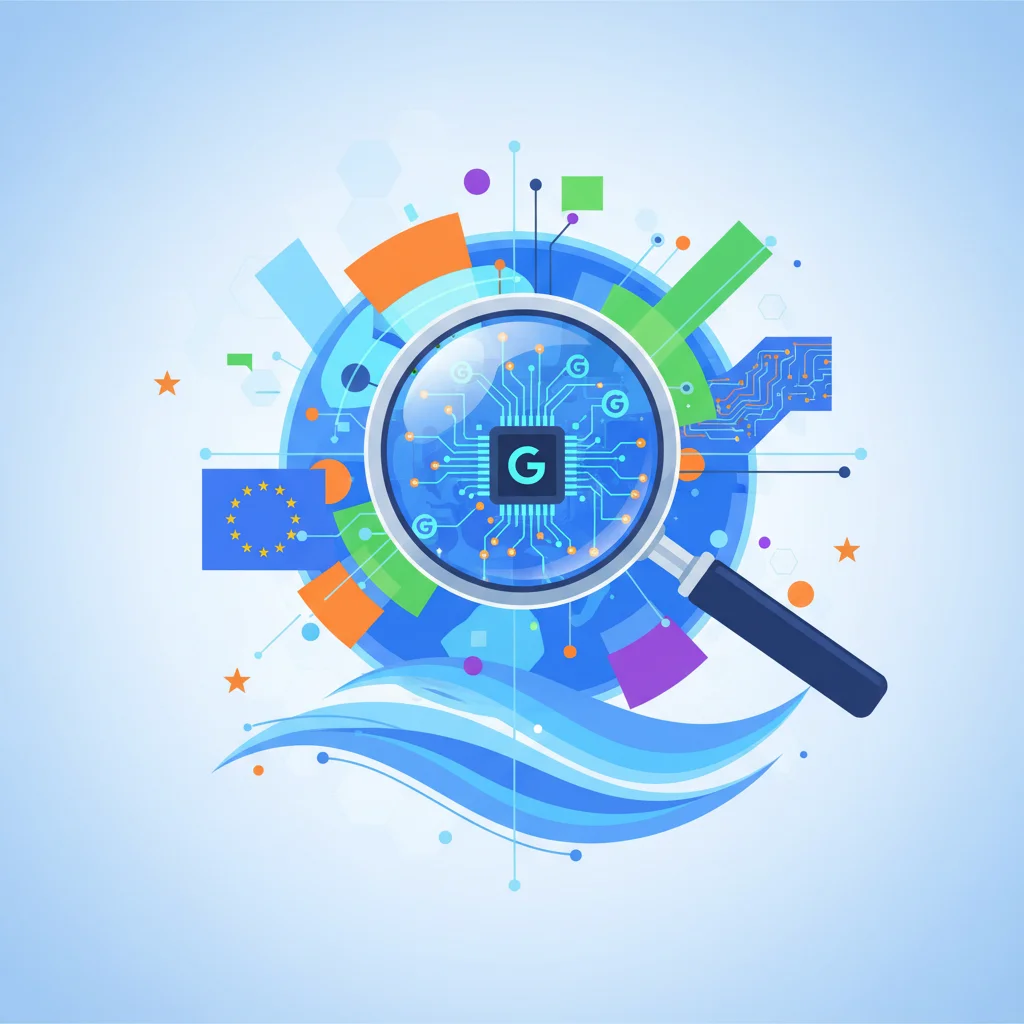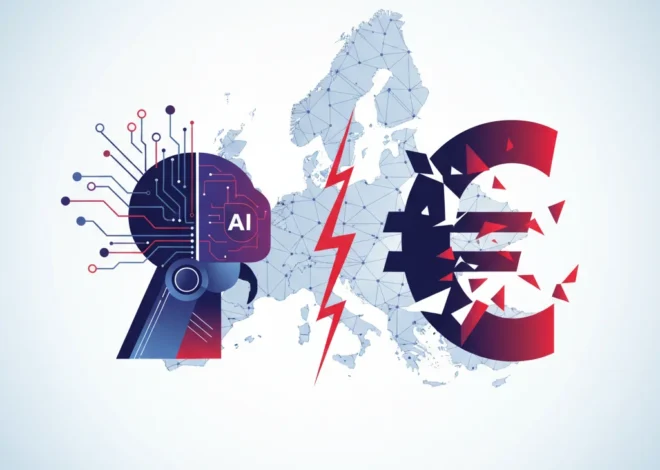
Google’s AI Under the Microscope: Why the EU’s New Probe Could Reshape the Internet
You probably started your day with it. Whether searching for the morning’s headlines, the weather forecast, or how to fix a bug in your code, you turned to Google. It’s the digital reflex of our era—an automated, seamless gateway to the world’s information. But behind that simple search bar lies one of the most complex and powerful pieces of software ever created, an engine driven by sophisticated artificial intelligence and machine learning models.
Now, that very engine is in the crosshairs. The European Union is gearing up to launch a fresh investigation into Google, this time targeting the holy of holies: its search ranking algorithm. According to a report from the Financial Times, Brussels is leveraging its powerful new rulebook, the Digital Markets Act (DMA), to scrutinize how Google ranks news publishers. This isn’t just another slap on the wrist or a multi-billion dollar fine. This is a direct challenge to the core mechanism that has made Google the undisputed king of the internet, with profound implications for startups, developers, and the future of digital innovation.
The DMA: A New Sheriff in the Wild West of Tech
Before we dive into the specifics of Google’s algorithm, it’s crucial to understand the weapon the EU is wielding: the Digital Markets Act (DMA). For years, regulators have played a cat-and-mouse game with Big Tech, often arriving with penalties long after the market has been distorted. The DMA is designed to change that. It’s not about punishing past behavior; it’s about setting proactive rules for the road.
The act identifies a handful of “gatekeepers”—massive online platforms like Google, Apple, and Meta—that control access to entire digital ecosystems. These gatekeepers are now subject to a list of “do’s and don’ts.” The goal? To pry open their walled gardens, prevent them from unfairly favoring their own products, and create a more level playing field where smaller companies and startups can compete and innovate.
This new probe into Google’s news rankings is one of the first major tests of the DMA’s power. The allegation is a familiar one: that Google might be manipulating its search results to give its own services an edge or to unfairly demote certain news publishers, thereby controlling the flow of information and advertising revenue. But with the DMA, the potential consequences are far more severe than ever before.
Is the AI Gold Rush a House of Cards? Why a Top Bank is Quietly Hedging Its Bets
Inside the Black Box: Why Regulating an AI Algorithm is So Hard
At the heart of this investigation is Google’s search algorithm, a system that has evolved from a relatively simple set of rules into a sprawling, self-learning AI. It uses thousands of signals, processed through advanced machine learning models, to determine which of the trillions of web pages is the most relevant answer to your query—all in a fraction of a second. This entire process is a marvel of automation and large-scale cloud computing.
For regulators, this presents a monumental challenge. How do you regulate a “black box”? The algorithm’s decision-making process is not static; it’s constantly learning and adapting. The exact weighting of its signals is a closely guarded secret, and even Google’s own engineers may not be able to fully explain why the AI made a specific ranking decision. This opacity is a nightmare for anyone trying to prove bias or anti-competitive behavior.
This is where the DMA’s new powers come in. It can compel gatekeepers to be more transparent about how their algorithms work and even demand access to the data that fuels them. For developers and those involved in programming, this could be a seismic shift. A world with more transparent, interoperable platforms could unlock new opportunities, but it also raises complex questions about intellectual property and cybersecurity.
A Familiar Battleground: The EU’s Long History with Google
This is hardly the first time Brussels and Mountain View have clashed. The EU has a long and storied history of holding Google accountable for its market dominance. This new investigation builds on a foundation of previous antitrust battles that have cost Google billions.
Here’s a brief look at their history of major antitrust clashes:
| Case | Year of Fine | Fine Amount | Core Allegation |
|---|---|---|---|
| Google Shopping | 2017 | €2.42 billion | Illegally promoting its own comparison shopping service in search results. |
| Android | 2018 | €4.34 billion | Using the Android mobile operating system to cement the dominance of its search engine. |
| AdSense | 2019 | €1.49 billion | Imposing restrictive clauses on third-party websites that prevented rivals from placing their search adverts. |
While these fines were staggering, many critics argued they were just the “cost of doing business” for a company of Google’s scale. The DMA changes the calculus. Fines can now reach up to 10% of a company’s global annual turnover, or even 20% for repeat offenses (source). More importantly, the EU now has the power to impose “structural remedies,” which could mean forcing Google to sell off parts of its business—a true nuclear option.
The Ripple Effect: What This Means for the Broader Tech Ecosystem
This investigation isn’t happening in a vacuum. Its outcome will send ripples across the entire digital economy, affecting everyone from solo developers to enterprise SaaS providers.
- For Startups & Entrepreneurs: This is a double-edged sword. On one hand, a more tightly regulated Google could create openings for new search engines, news aggregators, and other services to emerge. A fairer playing field is the dream of every entrepreneur trying to compete with an incumbent. On the other, increased regulatory complexity could create new barriers to entry and make it harder to scale services that rely on the gatekeepers’ platforms.
- For Developers & Programmers: The push for transparency and interoperability under the DMA could be a game-changer. Imagine having API access to core ranking signals or being able to build services that seamlessly integrate with dominant platforms. This could unleash a wave of innovation. However, it also means navigating a more complex web of compliance and data-sharing rules, bringing cybersecurity and privacy to the forefront of every programming decision.
- For the News Industry: For news publishers, this is an existential fight. Many have seen their ad revenue decimated and their traffic become almost entirely dependent on the whims of Google’s algorithm. A favorable outcome could rebalance the power dynamic, giving them more leverage and a fairer slice of the pie. According to some estimates, a significant portion of traffic to news sites originates from search and social platforms (source), making this a critical issue.
Robotaxi Reality Check: Why Wall Street Is Pumping the Brakes on AI's Driving Dream
The Geopolitical Chess Match
Adding another layer of complexity is the geopolitical tension simmering in the background. The FT article notes that this probe is proceeding despite threats from the camp of former US President Donald Trump about imposing retaliatory tariffs. This highlights a long-standing friction: many in the US view the EU’s aggressive regulation of American tech giants as a form of digital protectionism.
This isn’t just a corporate dispute; it’s a clash of regulatory philosophies and a key battle in the fight for “digital sovereignty.” The EU is determined to forge its own path in the digital age, setting rules that reflect its values around privacy, competition, and fairness. The US, meanwhile, has historically favored a more hands-off approach to foster innovation. The outcome of cases like this will shape the global regulatory landscape for decades to come.
The Dawn of a New Digital Era?
The EU’s investigation into Google’s search algorithm is more than just another legal battle. It’s a landmark moment that pits one of the world’s most powerful regulators against one of the world’s most powerful AIs. It’s a direct confrontation with the opaque, automated systems that now govern so much of our digital lives.
The questions at stake are fundamental. Can a democratic society impose its values on a self-learning algorithm? Is it possible to mandate fairness in a system built for optimization? And can we create a digital marketplace that fosters both massive innovation and genuine competition?
As regulators knock on the door of the AI black box, the entire tech world is holding its breath. What they find inside—and what they choose to do about it—could define the next decade of the internet.
Shein's Parisian Paradox: The AI, Automation, and Controversy Behind a Retail Revolution


